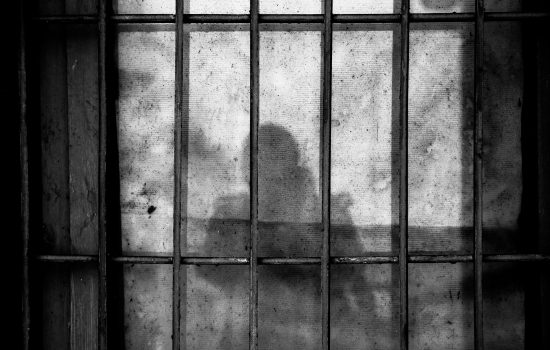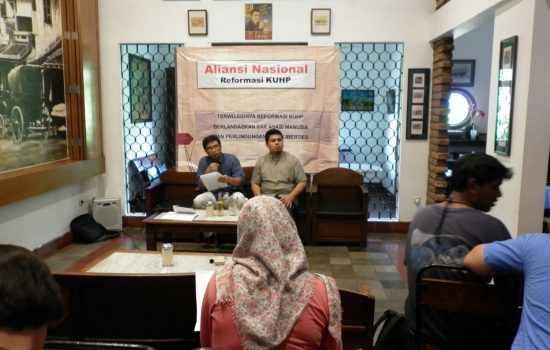On Thursday, 28 October 2016, the House of Representatives conduct plenary meeting to determine the revision of the ITE Law which has been discussed by the Working Group of Commission I at the House. After nearly six months, finally the draft Law on amendment to Law No. 11 of 2008 on Information and Electronic Transactions (Draft on the ITE Law Revision) is approved by 10 factions in the Commission 1 at the House of Representatives. The approval from the 10 Fraction of the House was presented in a meeting of Commission 1 at the House with the Minister of Communications and Informatics on October 20, 2016.
Institute for Criminal Justice Reform (ICJR) and Legal Aid Center for the Press (LBH Pers) has repeatedly expressed its concern about the “half-hearted” directional change of the ITE Law. From the beginning the government does have a lot of interest regarding the enforcement of the ITE law, specifically related to freedom of expression. Changes made to the ITE Law are only legitimizing the interests of the government to curb critical attitude of Indonesian society by adding new government powers. Mostly, all amendments add new powers to the government.
From the beginning, we expressed deep disappointment mainly related to the discussion process of the ITE Law which closed to public observation. In our observation, none of the discussion of Draft on the ITE Law Revision which opened by the Chairman of Commission I and Chairman of the Working Committee of Commission I, and it was a setback and wounded the spirit of the leaders of the House to make a more modern, transparent, and accountable House of Representatives.
We decline various provisions in the Amendment to the ITE Law based on five arguments below.
First, the government should repeal Article 27 paragraph (3), not only reduce its criminal sanction.
The government’s argument is weak, that by reducing the multiple interpretations and avoid abuse of power against the prohibition to distribute and / or transmitting and / or make the accessibility of Electronic Information which contains insult and / or defamation as stipulated in Article 27 paragraph (3) Jo. Article 45 paragraph (1) of the ITE Law, there are 4 amendments, including: (1) Add a clarification on the term “distribute, transmit and the accessibility of Electronic Information and / or Electronic Documents; (2) Confirm that the provisions is a crime by complain type (delik aduan) not a general crime (3) Confirm that the provision refers to the provisions of defamation and slander set out in the Indonesian criminal code (4) Lowering the criminal penalty of a maximum of 6 (six) years in prison and a fine of IDR 1 billion to 4 (four) years and a fine of IDR 750 million.
ICJR and LBH Pers hold that norms and practices of the Amendment remains a potential threat to freedom of expression. Besides, there is the issue of duplication of criminal offenses because the provisions in the Criminal Code are still able to reach acts done by using the internet medium. Problems that occur are such criminal provisions are shown to still be multi interpreted and easily misused. Reducing the sanction will not answer the root of the problem because in practice, law enforcement officials often use multiple charges, so the existing sanction may cause someone to be reported based on article 27 paragraph (3).
Second, the criminal procedure law changes in the ITE Law authorizes the discretion of law enforcement officers who are too broad without judicial scrutiny
Government syncs several provisions on the procedural law in the ITE Law with procedural law in the Criminal Code, as follows: The provisions of Article 43 paragraph (3) of the Warrant and / or foreclosure previously had to obtain permission from the Head of District Court, adjusted back to the provisions of the Criminal Article 43 paragraph (6 ) concerning detention that previously had to request the stipulation from the head of District Court within 1 x 24 hours, adjusted back to the provisions of the Criminal Procedure Code.
We denounced the deterioration process of “fair trial” in the provisions of arrest, detention, search, and seizure in the revision of the ITE Law. Because previously, arrest and detention process in the ‘”old” ITE Law still requires approval from the Head of District Court (Article 43 paragraph 6) and this shows Indonesia’s progress in harmonizing national legislation with international obligations. By eliminating the permission from the Head of District Court, forceful measures will be the discretion of law enforcement officials.
Third, Criminal Cyber Bullying Problem potentially worse than article 27 paragraph (3) of the ITE Law
Ccyber bullying is inserted in Article 29. Criminalization policies that include Cyber Bullying are also potential to be over-criminalized. Formulating the cyber bullying as a crime in article 29 of the ITE Law would be a serious problem. Many criminal experts and foreign countries have difficulty in formulating the terms of cyber bullying. Besides, all the provisions of cyber bullying has been included in many criminal provisions of the ITE Law.
Revision of the ITE Law is too far, because until now Indonesia has not had a legal standard definition on bullying in the traditional forms, but the revision of UU ITE, instead provide standard definition on cyber bullying. Because there is no standard definition of traditional cyber bullying, then the formula that will be used is flexible and causes a lot of interpretations (multipurpose act). In such conditions, this criminal offense is prone to be misused in the enforcement process. Thus, the gap opened on the suppression of freedom of expression in cyberspace. With the inclusion of this new criminal offense and the provisions of Article 27 paragraph (3) on Cyber Defamation, it is clear that the Revision of the ITE Law still potential to threaten freedom of expression in Indonesia
Fourth, regarding to Content Filtering and Blocking, the ITE Law Revision actually add authority of the Government without regulating adequate obligations and procedures
The government inserts additional powers to the provisions of Article 40: (a) The Government shall take preventive dissemination and use of prohibited Electronic Information and / or Electronic Documents, in accordance with laws and regulations (b) In that regard, the Government is authorize to block the access to the prohibited Electronic Information and / or Electronic Documents. These provisions may have implication that the government officials will easily filter and block several contents.
Minimum procedure to block the access and inadequate indicator on the “prohibited contents” will result in excessive authority that is easily misused by the Government
Fifth, the provision on negative news to someone in the past (the right to be forgotten)
The government said this provision was proposed by the Commission I inspired from several European countries that had already enacted it, and this was agreed by the government. In the ITE Law revision, someone may only try to remove negative news on hem/her in the past after being approved by court
The government adds a provision concerning “the right to be forgotten” on the provisions of Article 26, namely (a) Each Operator Electronic System shall delete the irrelevant Electronic Information and / or Electronic Records under its control at the request of the concerned by court order (b) Each Electronic System Operator shall provide a mechanism to eliminate irrelevant Electronic Information and / or Electronic Document in accordance laws and regulations. (C) The procedure of Electronic Information and / or Electronic Records elimination will be regulated further in Government Regulation.
This article will become new problem; this provision may become a tool of the government in addition to the dual authority of the content screening. This provision could have negative consequences because it can be a new tool for censoring news, media and journalist publication in the past




